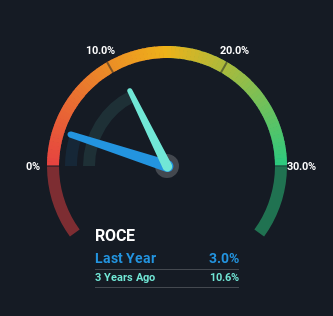- South Korea
- /
- Semiconductors
- /
- KOSDAQ:A089790
Returns On Capital Signal Tricky Times Ahead For JT (KOSDAQ:089790)
If you're looking for a multi-bagger, there's a few things to keep an eye out for. Typically, we'll want to notice a trend of growing return on capital employed (ROCE) and alongside that, an expanding base of capital employed. Basically this means that a company has profitable initiatives that it can continue to reinvest in, which is a trait of a compounding machine. Having said that, from a first glance at JT (KOSDAQ:089790) we aren't jumping out of our chairs at how returns are trending, but let's have a deeper look.
What Is Return On Capital Employed (ROCE)?
Just to clarify if you're unsure, ROCE is a metric for evaluating how much pre-tax income (in percentage terms) a company earns on the capital invested in its business. The formula for this calculation on JT is:
Return on Capital Employed = Earnings Before Interest and Tax (EBIT) ÷ (Total Assets - Current Liabilities)
0.03 = ₩1.8b ÷ (₩100b - ₩40b) (Based on the trailing twelve months to March 2024).
So, JT has an ROCE of 3.0%. Ultimately, that's a low return and it under-performs the Semiconductor industry average of 5.4%.
Check out our latest analysis for JT

While the past is not representative of the future, it can be helpful to know how a company has performed historically, which is why we have this chart above. If you're interested in investigating JT's past further, check out this free graph covering JT's past earnings, revenue and cash flow.
So How Is JT's ROCE Trending?
When we looked at the ROCE trend at JT, we didn't gain much confidence. Over the last five years, returns on capital have decreased to 3.0% from 17% five years ago. Given the business is employing more capital while revenue has slipped, this is a bit concerning. If this were to continue, you might be looking at a company that is trying to reinvest for growth but is actually losing market share since sales haven't increased.
Our Take On JT's ROCE
In summary, we're somewhat concerned by JT's diminishing returns on increasing amounts of capital. Yet despite these concerning fundamentals, the stock has performed strongly with a 88% return over the last five years, so investors appear very optimistic. In any case, the current underlying trends don't bode well for long term performance so unless they reverse, we'd start looking elsewhere.
One more thing, we've spotted 2 warning signs facing JT that you might find interesting.
For those who like to invest in solid companies, check out this free list of companies with solid balance sheets and high returns on equity.
New: Manage All Your Stock Portfolios in One Place
We've created the ultimate portfolio companion for stock investors, and it's free.
• Connect an unlimited number of Portfolios and see your total in one currency
• Be alerted to new Warning Signs or Risks via email or mobile
• Track the Fair Value of your stocks
Have feedback on this article? Concerned about the content? Get in touch with us directly. Alternatively, email editorial-team (at) simplywallst.com.
This article by Simply Wall St is general in nature. We provide commentary based on historical data and analyst forecasts only using an unbiased methodology and our articles are not intended to be financial advice. It does not constitute a recommendation to buy or sell any stock, and does not take account of your objectives, or your financial situation. We aim to bring you long-term focused analysis driven by fundamental data. Note that our analysis may not factor in the latest price-sensitive company announcements or qualitative material. Simply Wall St has no position in any stocks mentioned.
About KOSDAQ:A089790
JT
Engages in the research, development, and sale of semiconductor process and automation equipment in South Korea and internationally.
Adequate balance sheet with low risk.
Market Insights
Community Narratives



